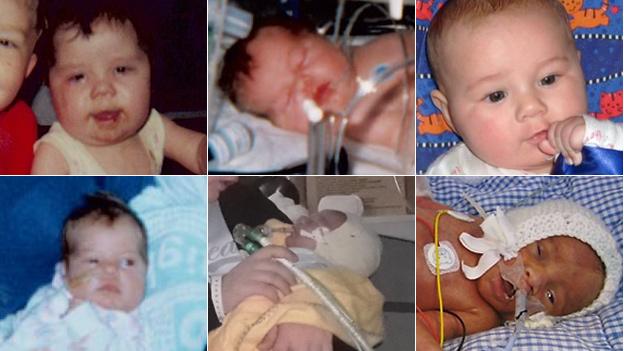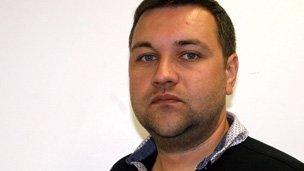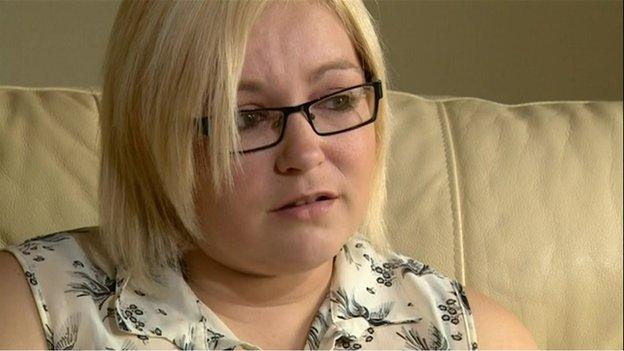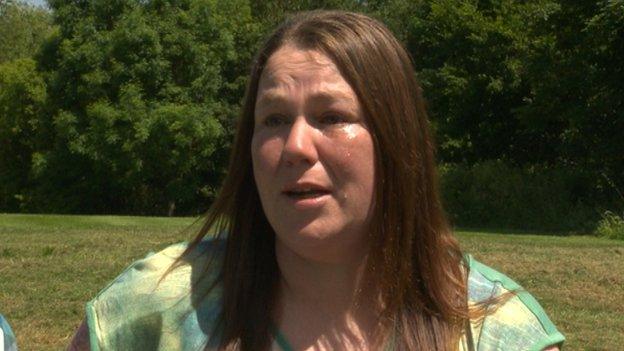Shrewsbury baby ashes inquiry calls for national inspector of crematoriums
- Published
David Jenkins, who led the independent inquiry, said there should be a national inspector
A national inspector should be created for crematoriums after bereaved parents were unable to receive their babies' ashes, an inquiry has concluded.
About 60 families are believed to have been affected by failures at Shrewsbury's Emstrey crematorium between 1996 and 2012.
The Shropshire Council-commissioned report, external said poor training and out-of-date equipment were mainly to blame.
The council said it would be shocked if there were not similar cases.
David Jenkins, who led the independent inquiry, said he had been "struck by the absence of authoritative national guidance".
'Historic' failures
He recommended the government appoint an independent inspector to oversee standards across England.
Keith Barrow, leader of Shropshire Council, said he "would be shocked if this wasn't happening all over the country".
Staff at Emstrey told the inquiry they were not aware babies' ashes could be recovered from the cremators.
Some said training did not cover the possibility of manually overriding the equipment, which the manufacturer has said would have provided infant ashes.
The report said no ashes were handed over to parents of children under the age of one between 1996 and 2013.
Mr Jenkins said the practice seemed "to have been accepted locally as the norm".
Jordan Howard said she was devastated
The inquiry in Shrewsbury followed an investigation by BBC Radio Shropshire, which prompted a campaign by local parents under the Action for Ashes banner.
It followed a similar investigation in Scotland after failures at the Mortonhall crematorium in Edinburgh.
A Freedom of Information inquiry by the BBC last year found the ashes of more than 1,000 babies were not handed to their parents between 2008 and 2013.

About 60 families did not have their babies' ashes returned to them
'Felt like body snatching'
Shropshire Council said since new equipment was installed at the end of 2012, babies ashes had been recovered in all cases.
Old equipment meant the small quantity of ashes resulting from a baby's cremation were lost in the system, as staff failed to manually override the cremators.
By 2009, staff told the inquiry the equipment was in "poor condition", with only "basic" maintenance. The computer control system, meanwhile, was "archaic" and obsolete".
Shropshire Council chief executive Clive Wright offered ''his sympathy and sincere apologies to the bereaved families for the distress they have suffered''
Cooperative Funeral took over the running of the Emstrey site in 2011 and said its first priority was to replace the aging equipment.
The new cremators have a specific setting for cremating infants.
Some parents told the inquiry that having even a "teaspoonful" of ashes would have helped them come to terms with the death of their babies.
One said failing to hand over ashes "felt like body snatching".
Glen Perkins, who formed the Action for Ashes campaign group, lost his daughter Olivia to Sudden Infant Death Syndrome in 2007.
"We don't have a headstone or plaque in the ground for her because we had nothing to put there," he said.
"I don't know where my baby is. Is she mixed in with someone else, has she been scattered at sea, in a river or a beach?"
Mr Jenkins said it was clear there was "no more painful experience" than losing a child and that the issue of infant cremation should be treated as of "the utmost importance".
Shropshire Council said it would be liaising with parents and Cooperative Funeralcare to ask their views on a suitable memorial or memorial service.

Analysis: Nick Southall, BBC Radio Shropshire

It started two years ago - we were told about the case of a two-month-old baby. Then we submitted a Freedom of Information request to Shropshire Council, which owns the crematorium, and found out about 30 cases dating back over a decade.
We already know this inquiry has gone back further to the late 1990s and in all they have identified 60 cases where the ashes were not recovered and were not returned, and the question is why?
Shrewsbury isn't alone with this problem - its a postcode lottery in England and Wales. The likelihood of getting remains depends on where you live.
Documents show infants at Emstrey were cremated in the same conditions as adults. If those conditions aren't modified, the small amount of ashes generated in a baby's cremation are at risk of being blown away by air jets used in the process.
I spent time at South West Middlesex crematorium, which guarantees the return of ashes, to find out how it was done.
I have seen human remains from a 23-week-gestation foetus, which proves if you modify the cremation conditions, you recover ashes.
Today's report has concluded staff at Emstrey didn't modify those conditions to stop this from happening.
Families now face a lifetime of not knowing what happened to their children's remains, with the possibility they were lost in the cremator machinery's flue system and later strewn in the garden of remembrance.

- Published1 June 2015

- Published1 June 2015

- Published1 June 2015

- Published17 June 2014
